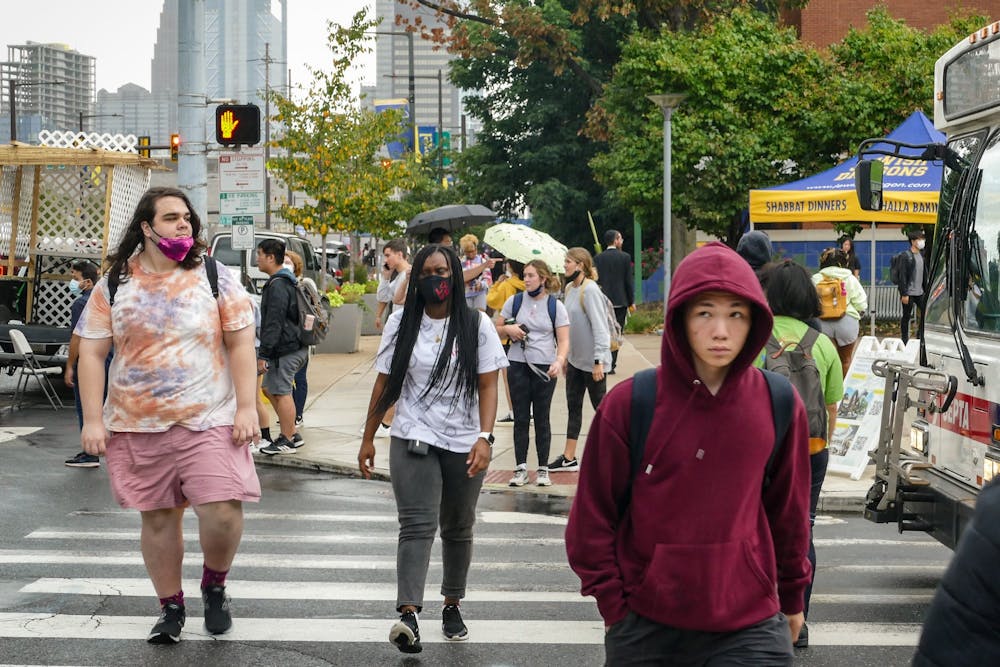
Market Street and Chestnut Street, two high traffic thoroughfares near campus, will undergo bicycle lane construction, a project which has garnered ongoing support from both the Penn community and administration.
Bike lanes on Market Street will be extended from 34th Street to 30th Street, and on Chestnut the repaving will include a new parking protected bike lane from 63rd Street to 45th Street. This will establish an upgraded bike lane system that connects West Philadelphia and Center City.
The renovations, announced by the city in February, will contribute to Philadelphia’s Vision Zero initiative to eliminate all traffic-related deaths by 2030. Accidents on both streets are among the highest in Philadelphia, among the 12% of city streets that contribute to 80% of all serious and fatal crashes.
Officials from Penn’s Division of Public Safety, which works closely with Philadelphia on bike lane construction near campus, have voiced their support for the proposed plans. Not only are bikers shielded from oncoming traffic, motor vehicles are provided clear instruction on where they can and can’t drive, according to Interim Vice President for DPS Kathleen Shields Anderson.
According to Anderson, the death of Drexel graduate Jamal Morris in a hit-and-run accident at 45th and Market streets acted as the impetus for much of the bike lane improvement efforts. Morris’ parents and other Philadelphia residents formed Families for Safe Streets Greater Philadelphia, which has supported improvements in bike lanes across the city.
West Philadelphia resident and College first year Faith Applegate grew up biking from her West Philadelphia home into the city. While she said she felt comfortable on more established bike lanes, she was otherwise frustrated with the dangerous conditions of some of the bike lanes connecting West Philadelphia to Center City.
“Biking in the city is like gambling your life, and it shouldn’t be like that,” Applegate said. “Bike lanes are good to invest in because they provide an affordable mode of transportation that is good for the environment and good for people's health. Many people bike to work. This isn’t just about leisure, it's about livelihood.”
College first year and Philadelphia native Ryo Lindsey told The Daily Pennsylvanian that he biked almost everywhere he went in Center City while he was growing up, as his family did not own a car.
Lindsey was in a serious bike accident in 2020 in South Philadelphia when he cut through a parking lot because of a break in a bike path. He has since made an almost full recovery from the accident, but he had to undergo knee surgery for a dislocated tibia.
Lindsey voiced his support for the plans to repave Market and Chestnut, especially the protected bike lanes. He said he believes this will prevent the issue of Ubers idling in bike lanes and cars using them for parking and turning lanes.
Philadelphia’s Office of Transportation, Infrastructure, and Sustainability, responsible for the Chestnut and Market streets projects, did not respond to inquiries from The Daily Pennsylvanian, as the initiative is an ongoing city matter.
Proposals for bike lanes historically have not always been guaranteed swift implementation. Nearly two years ago, Philadelphia proposed plans to revamp Washington Avenue, slimming a busy five-lane street into one with two bike lanes and three lanes for cars.
However, the Office of Transportation, Infrastructure, and Sustainability began reconsidering plans after concern rose in 2020 among Point Breeze residents who felt who unrepresented in planning, with some citing concerns over gentrification, a delay in emergency responses, and a lack of representation of the community in planning.
Under the new plan announced March 1, some lanes of Washington Avenue will have three lanes of traffic, with others having four or five.
The Bicycle Coalition of Greater Philadelphia, an organization that works with the Department of Transportation and the Streets Department, was heavily involved in planning and introducing bike lanes on Washington Avenue.
Research Director John Boyle said he anticipates that the Market and Chestnut repaving plans will be implemented faster than the stalled Washington Avenue plans as there is a favorable consensus among Philadelphia community members.
“This [project] has been proposed for a very long time. The District Councilperson Jamie Gauthier is a planner and has been very supportive of extending the bike lanes for both ways,” Boyle said. “There has been a lot of community involvement — I am optimistic that this will go on without a hitch.”
The Daily Pennsylvanian is an independent, student-run newspaper. Please consider making a donation to support the coverage that shapes the University. Your generosity ensures a future of strong journalism at Penn.
Donate






